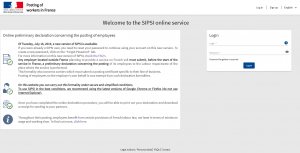Employees posted in France by an employer based outside the EU, the EEA or Switzerland
Thématiques
Date de mise à jour
For social security purposes, a seconded employee is one who has been sent by a foreign-based employer to perform a temporary assignment in France.
The chain of command between the employee and the employer is maintained during the assignment in France. Under certain conditions, the employee may be covered by the social security system of the country in which they usually work. In such cases, social security contributions are paid in the individual’s country of origin.
To work in France, other formalities are required for citizens of countries outside the European Union, the EEA and Switzerland. Check our dedicated section “Visa, staying and working”
| Helpful tip : When an employee is posted in France, regardless of their nationality, a secondment declaration must be submitted by their foreign-based employer using the online “Sipsi” service provided by the Ministry for Labour.
|
Posted employees covered by a social security agreement
Seconded employees from countries that have signed bilateral agreements with France can remain registered to the social security system in their country of origin for all or part of their secondment period in France.
The period of time during which the employee will retain social security cover is specified in the bilateral agreement (this can range from a few months to five years). Depending on the agreement in place, this initial secondment period may be renewed. It is important to check the terms of the relevant bilateral agreement to better understand the scope of the posting (duration of the posting, employee rights, risks covered).
In order for the employee to retain their usual social security cover, the employer must apply for a secondment certificate from the relevant social security body in the country of origin, before the individual arrives in France. This certificate attests that the employee continues to be covered by the health insurance system in their country of origin. This part of the procedure is essential if the employee is to benefit from the provisions of the bilateral agreement.
Some bilateral agreements do not cover all healthcare costs, pensions, unemployment benefits, etc. Employees and employers must therefore contribute to the French social security system to cover any expenses that are not included.
Bilateral agreement with France.
Who should you contact to obtain a secondment certificate?
End of secondment
At the end of the initial or extended duration of the posting as provided for in the bilateral agreement, posted employees are compulsorily affiliated to the French social security system.
They can nevertheless decide to maintain their affiliation with the social system of their country of origin: this is a double contribution.
For further information, visit the Center of European and International Liaisons for Social Security (CLEISS) website.
In practice
- Employee: Supplies proof that they are registered in their country of origin.
- Employer: Contacts the relevant social security organization in their employee’s country of origin so as to obtain a secondment certificate.
- Confirmation of secondment by the foreign organization.
- Once the certificate has been issued, the employer must keep a copy and send another to the seconded employee.
- The terms under which medical expenses are covered in France depend on the bilateral agreement in place.
- In the event that they wish to extend the secondment period, the employer must send a request to the relevant social security organization in their employee’s country of origin, which may or may not approve the request. The CLEISS must confirm this approval before the extension can be granted.
Seconded employees not covered by a bilateral agreement
In the absence of a bilateral social security agreement, employees posted to France must be registered to the French public health insurance system under the terms explained in the “Employees: Registering for French social security” section.
What is a social security convention?
Source : CLEISS


